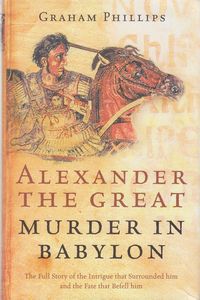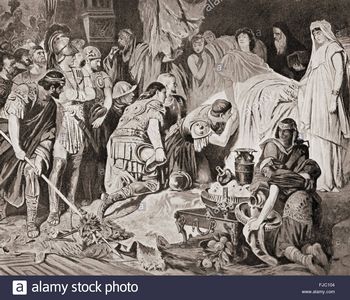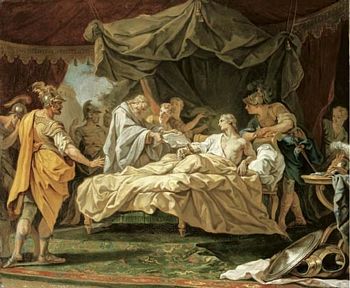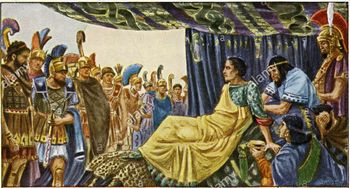murder in Babylon
| série: | Alexandre le Grand |
| éditeur: | Virgin |
| auteur: | Philipps Graham |
| classement: | biblio501 |
| année: | 2004 |
| format: | cartonné avec jaquette |
| état: | TBE/N |
| valeur: | 10 € |
| critère: | *** |
| remarques: | English book 1/ the final banquet 2/ forensic opinion - Alexandre was now 32 years old and has conquered nearly the whole world after 32'000 km and 12 years of conquest; >> p. 1 he was known as Alexander the Great, however Alexander may have been the undisputed master of much of the known world, he was a slave to destiny, he did not die a warrior's death in battle but expired as helpless as a baby in his own bed - and according to Hieronymus of Cardia, Alexander was murdered by poison >> p. 2 description of the world at the time of Alexander - the accounts of Chares of Mytilene, chamberlain and biographer of Alexander as well as Aristobulus, military engineer are considered as being the most trustworthy >> p. 14 the death of Alexander by malaria and/or typhoid was rejected by a team of the university of Maryland, the belief of the author is that Alexander has been murdered by poisoning done through a conspiracy within the circle of close relatives and in this book, he brings forward his allegations and possible evidence in that connection >> p. 21 in fact, Alexander's body failed to show any signs of decay for six days, this bizarre preservation probably due to the poison absorbed and the author was told by the Poison Center of Los Angeles that this corpse's state was mainly due to poison - the poison was most probably made of vegetable toxins such as aconite, hemlock and belladona (nightshade) 3/ motive and opportunity - the first suspicion was that Hephaestion was also murdered by poison - during the final banquet, it seems that Alexander's madness had made him throw caution to the wind >> p. 44 the list of suspects, eight in all: - his three consortst (Barsine, Roxanne and Statira) - his three senior officers ((Meleager, Perdiccas and Seleucos) - his brother Arridaeus and the butler Iollas, son of Antipater 4/ Antipater - prelude to conquest - he was appointed by Philip II, commander of the Macedonian army and trained with Theban military tactics, namely creating the phalanx, - the improvement of cavalry and the creation of artillery as well as a kind of military police force: the heavy shield bearers called hypaspistes >> p. 51 this was the blueprint for the army that Alexander would later use to conquer much of the known world - moreover Philipp was a good diplomat and arrange alliances by marrying many princesses of neighbouring states 5/ Arridaeus, the early days - he was Alexander's half-brother from a previous marriage of Philip - he was deficient in intellect owing to bodily disease, this, however, did not come upon him in the course of nature of its own accord, it is said that as a boy he displayed an exceedingly gifted and noble disposition, but after Olympias gave him drugs which injured his body and ruined his mind - Alexander however must have been fond of his half-brother as he did not have him killed as he did other potential claimants - did Arridaeus harbour a bitter resentment against Alexander for depriving him of the throne and being humiliated? - in any case he arrived at Babylone a few weeks before Alexander fell ill and died, therefore he is one of the suspects 6/ Barsine, the glory years - Barsine fell in love with Alexander but was set aside when Alexander married Roxanne although Barsine had given much help to Alexander since the battle of Issus - Barsine's father Artabazus was Alexander's masterspy at the court of Darius and Barsine's brother, Pharnabazus, chief of the Persian navy after the death of Memnon, was captured, then escaped so that he could be safely returned to the Persian side, thanks Barsine, he was not put to death and became Alexander's ally after the battle of Gaugameles - Barsine was Alexander's lover for six years and bore him his first child, by june 323 BC, she was however a neglected woman with every reason to despise Alexander for jilting her for a girl less than half her age 7/ Seleucos, the harsh campaign - in Bactria, Alexander was faced with a protracted guerilla war, Darius had no longer any son to succeed him (his wife and young son were dead) and therefore, Bessus, as satrap of Bactria, was the most important man in Persia after Darius who had been weakened in losing two battles and had fled twice as a coward, thus by eliminating Darius, Bessus became king at his place rather easily >> p. 105 description of the hypaspistes whose commander-in-chief was Seleucos, it was a kind of SS-Waffen , an elite troop, an army within the army and Seleucos has great influence in the army >> p. 108 the affair with Philotas and Nicanor (sons of Parmenion) in which Seleucos was a whistleblower (dénonciateur) >> p. 111 the convict death battalion >> p. 117 with his hypaspistes reputation of brutality, Alexander was now considered rather like a butcher than a conqueror >> p. 118 the affair with the death of Clitus - due to his strong position, Seleucos may well have eyes on Alexander's crown 8/ Roxanne meaning "little star", land of mystery >> p. 132 the campaign into Magadha (atfer the one against Porus) was to prove a disaster that almost cost Alexander his crown - Roxanne was humiliated when Alexander married Statira, Darius' daughter (a marriage made mostly for political reasons) she was therefore one of a pirincipal for poisoning Alexander but could such an endearing and seemingly spiritually minded woman really have killed her husband three years later because he had taken a second queen? (it was said that Roxanne already had poisoned Hephaestion) 9/ Meleager, the long march home - he was commander of the Macedonian infantry and had spectacular military achievements but he was no longer in line with Alexander - Meleager survived the purge but he must have felt his position, even his life, to under threat and it seems that Meleager had every reason in the world to wish Alexander dead 10/ Statira, a sentence to death - after the death of his mother and her young brother as well as her father and following the destruction of Persepolis, Statira did not love Alexander when he married her and it was said that she promised to assassinate Alexander 11/ Perdiccas, the last days >> p. 168 the word magician coming from the sect of the Zoroastrian Magi - at the death of Hephaestion, Perdiccas became deputy of Alexander but this was probably a temporary appointment and Perdiccas would soon be replaced, if Perdiccas was aware of this, then it certainly gave him a motive for killing Alexander 12/ an empire divided - at Alexander's death and after much discussion, Perdiccas allied with Seleucos as his deputy, took the regency but his position remained precarious - Antipater remained governor in Europe, Ptolemy received Egypt, Nearchos became governor of western Asia Minor (Ionia), a general named Antigonus was governor of the east region (Cappodecia and Armenia?) whereas Seleucos within the next three years had taken control of the entire eastern empire and founded the Seleucid Empire which was to get the greatest part of Alexander's empire 13/ symbols of succession - Meleager and Statira were the only two suspects on the list to have already been in Babylon when Alexander arrived May 323 BC - however Meleager was captured and executed by Perdiccas and Meleager would not have been the murderer as he would have prepared his coup much better in advance >> p. 194 as a child, Statira had sworn that she would one day kill Alexander and she had approved the Zoroastrian death sentence by the priests but doing this murder she would have now to restore Persian power and this was not possible as she did not make alliance with any Persian allies so far such for exemple Atarepata, the only Persian ruler on his own at that time (he created the independent province Atropatema, later on Azerbadjan) - in fact Statira was quite on her own and soon after the death of Alexander, she was executed by Roxanne with the permission of Perdiccas >> p. 197 the transport of Alexander's body to Macedonia which was intercepted by Ptolemy and as Antipater was also planning to get the body, the mystery remains about what really happened to Alexander's corpse >> p. 199 it is ironic that the most famous soldier who ever lived should have had such an undignified epitaph - and after the death of Perdiccas, the empire was divided into three sections: a) Ptolemy got Egypt as well as Gaza, Judah and Palestine b) Macedonia and Greece remained under the command of Antipater c) the largest part of Alexander's empire was kept by Seleucos incl. the Indian part - Asia Minor was the only region not fully under anyone's control and was fought over by the Asians and Europeans for many years 14/ the Aegean dream >> p. 203 description of the Aegean sea and its population hereof the Minoan civilization on the island of Creta - Barsine and Nearchus intended to create a new kingdom with the Aegean islands and the Ionian cities which would have been called Anatolia but they did not succeed in performing their dream as Barsine and her son were captured by Cassandra and executed during an absence of Nearchus who finished his life being retired on Creta - those two could therefore probably not be involved in th emurder of Alexander 15/ a warrior queen (Olympias) could Olympias be involved in the plot against her own son? she had already manipulated Pausanias in the murder of Philipp II and had some resentment towards Alexander, so she could have manipulated Arridaeus with the murder of Alexander and she was also expert with drugs and poisonous plants - if Olympias did manipulate Arridaeus to poison Alexander then her attempts to accuse others of this murder would have been part of her plan but Olympias' action towards her own son would have been difficult to prove 16/ establishing means (Perdiccas) - he was above all an intrigant and therefore a main suspect >> p. 229 description of Hephaestion's death, similar to the one of Alexander - as the best suited plant for poisoning Alexander was the strychnine plant found in India, rather rare as specific to only some regions and unknown to doctors of that period except for the Indian sage Kalyana - as Perdiccas was unaware of this special poison, we can deduct that he was not the murder 17/ the murder unveiled (Roxanne) - in fact, Roxanne is the most likely suspect in murdering Alexander, she planned her action to the perfection, and she was the only one who had knowledge of the strychnine poison probably through the unvoluntary intermediary of Kalyana, he tried to dissuade Roxanne but was then also eliminated when arriving in Babylon (self-immolation) n.b. he tried to warn Alexander with his prophecy - as a princess of proud Sogdian character, Roxanne's likely motive had been jealousy of Alexander's mariage with Statira, she was also kept aside by Hephaestion whom was probably also murdered by Roxanne and having the support of Perdiccas for her child to come to be recognised as heir of Alexander, she also had shortly after Alexander's death Statira and Drypetis executed - unfortunately Roxanne and her son Alexander IV were not to reign and were on their turn executed by Cassander Conclusion Roxanne is the most likely person who could have murdered Alexander >> p. 245 the scenario of Roxanne's plan >> however the author is not completely certain about Alexander's murder however his story is worth being considered and is written like an investigaton by Sherlock Holmes annexes - book cover - three paintings of Alexander's death from various origins Information Hieronymus of Cardia, Greek general and historian from Cardia in Thrace, was a contemporary of Alexander the Great, after the death of Alexander he followed the fortunes of his friend and fellow-countryman Eumenes, he was wounded and taken prisoner by Antigonus who pardoned him and appointed him superintendent of the asphalt beds in the Dead Sea, he was treated with equal friendliness by Antigonus's son Demetrius who made him polemarch of Thespiae and by Antigonus Gonatas, at whose court he died at the age of 104 (!); he wrote a history of the Diadochi and their descendants, embracing the period from the death of Alexander to the war with Pyrrhus (323–272 BC), which is one of the chief authorities used by Diodorus Siculus and also by Plutarch; he made use of official papers and was careful in his investigation of facts, the simplicity of his style seemingly rendered his work unpopular to people of his time, but modern historians believe it was very good, in the last part of his work he made a praiseworthy attempt to acquaint the Greeks with the character and early history of the romans, he is reproached by Pausanias with unfairness towards all rulers with the exception of Antigonus Gonatas; like the even more famous lost history of Alexander by Ptolemy I of Egypt, no significant amount of his work survived the end of the ancient world Chares of Mytilene was a Greek belonging to the court of Alexander the Great, he was appointed court-marshal or introducer of strangers to the king, an office borrowed from the Persian court, he wrote a history of Alexander in ten books, dealing mainly with the private life of the king, the fragments are chiefly preserved in Athenaeus, these fragments are largely concerned with court ceremonies and personal gossip, including a description of Alexander's introduction of the Persian custom of proskynesis to his court (see Scriptores Rerum Alexandri (pp. 114–120) in the Didot edition of Arrian Aristobulus of Cassandreia, Greek historian, son of Aristobulus, probably a Phocian settled in Cassandreia, he accompanied Alexander the Great on his campaigns, he served throughout as an architect and military engineer as well as a close friend of Alexander, enjoying royal confidence, and was entrusted with the repair of the tomb of Cyrus the Great in Pasargadae, he wrote an account, mainly geographical and ethnological, it survives only in quotations by others, which may not all be faithful to the original, his work was largely used by Arrian, Plutarch also used him as a reference |
| couvertures: |     |
Copyright 2008 - 2026 G. Rudolf
